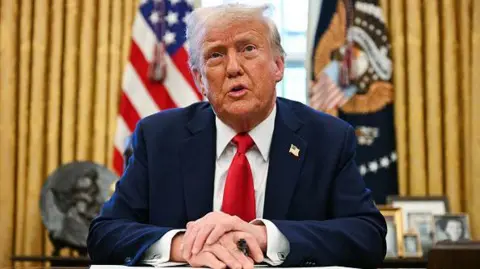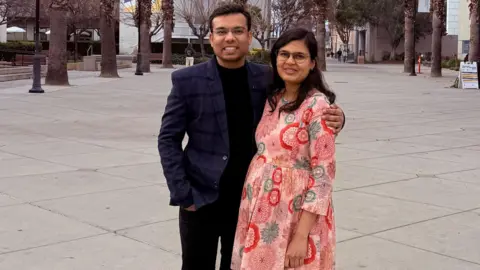Writer
 BBC
BBCNeha Sadfut and Akshay Pais were ready to welcome their first child.
Indian couples who have been working in the United States for more than a decade are engineers H-1B visas for skilled foreign workersTheir son – on February 26 – is expected to be born an American citizen.
They worked at a large technical institution with a supported parental leave policy and carefully built their lives at California’s San Jose.
But President Donald Trump has recently thrown a wrench in their American dream, which will announce a rule and deny automatic American citizenship for children born to temporary foreign workers. Until now, birthright citizenship was granted regardless of the parents’ immigration.
There is a federal judge in Maryland Blocked the orderExtension of the initial two -week constituency imposed by the court in Seattle. This means that although the High Court is likely to defeat any verdict, the verdict cannot be implemented until the case is resolved.
Accidental uncertainty, along with many cases and legal challenges, left Akshay, Neha and thousands of others in Limbo.
“This affects us directly,” says Akshay. “If the order comes into effect, we don’t know what will come next – this is an unnamed territory.” Their biggest question: What nationality will their child be?
New York -based immigrant lawyer Cyrus Mehta says their concern is valid: “There is no provision for the US law to give migrant status to a person born here.”
As their child’s appropriate date is approaching, they consulted their doctor about early delivery. Advice? If everything happens properly, they can trigger labor in the 40th week, but they have chosen to wait.
“I want the natural process to take its course,” says Neha. Akshay added: “My priority is a safe delivery and my wife’s health. Citizenship comes in second place.”
 Getty pictures
Getty picturesAfter media reports of families looking for early C-divisions, he reached the United States of America’s House of Communications of the American Doctors Association of Indian origin (AAPI). Except for “a few events in New Jersey”, most doctors have no such inquiries.
“In a country with strict medical laws, I would strongly advise C-sections against citizenship,” said Ohio-based physician. “Our doctors will not do them if they are not ethical and medically needed.”
American citizenship is highly desirable, especially by the talented H -1B visa holders. The second largest migrant group in the United States is Indians.
Immigration Policy Analyst Sneha Puri warns that a birthright citizenship order will severely affect Indians – more than five million Indians in the United States have non -diaspora visas.
“If implemented, none of the children born in the United States will get citizenship in their future,” he told the BBC.
South Asian parents have concerns over order impact on online groups and the next steps.
Trump’s administrative directive states that the ability to obtain documents on the US citizenship of the children of legal permanent residents will not affect.
But Indians in the United States face the longest waiting of any foreign nationality to obtain a green card that provides a legal permanent residence.
The current US rules should not exceed 7% of the total number of green cards issued to any country.
Indians receive 72% of H -1B visas annually. According to Cato Institute, 62% of Indians in the backing of the employment -based backdrop for people waiting for green cards – this is 1.1 million – 2023. Indians who received employment -based green cards applied today in 2012.
In his statement, David Pierre Cado’s Immigration Director Warnings: “New Indian applicants face a lifetime waiting. 400,000 people are likely to die before receiving the Green Card.”
On the contrary, other immigrants get a permanent residence within a year and accelerate the path of citizenship.
If implemented, Trump’s administrative order will affect the United States unpredictable, and the children born in the United States have previously received citizenship – who can go to finance parents to apply for a green card at the age of 21.
As of 2022, the Pew Research estimates 725,000 unpredictable Indian immigrants in the United States, which is the third largest group. On the contrary, the Migration Policy Company puts this number to 375,000, India ranks fifth. Unauthorized diaspora accounts for 3% of the US population and 22% of the population born abroad.
The main concern for Indians in H-1B or O visas is their children’s quality of life.
Such visa holders must leave the United States from time to time to seal their visas at a US embassy abroad. Those who return to India for this purpose often face delays in gaining a meeting for this purpose.
These immigrants do not want to endure the same bureaucratic struggles in their United States.

Akshay, who has been waiting for the Green Card for many years, makes it easy to bring US citizenship.
“We have been here for over 10 years. When I see my parents age, I am very important to get citizenship. The journey becomes tricky for us by integrating visa stamp times and now it can be very difficult with my child,” he said.
Many doctors in the United States oppose Trump’s decree, which illustrates the role of foreign skilled workers in providing major services.
Dr. Gadula says Indian doctors in rural areas such as North and South Dakota are important. “Without them, the healthcare will collapse. Now, they are active about starting families,” he said.
He has called on the process of obtaining a green card for the children of these workers to be granted birthright citizenship due to parents’ contributions to the United States.
Trump’s directive has raised concerns among Indians on student and work visas, and their dangerous legal status is already known. A guarantee – the citizenship of children born in their United States – is now in doubt.
In April, San Jose resident Priyanshi Jaju is looking for clear changes in anticipation of a child. “Should we contact the Indian Embassy for the passport? Which visa is applied? There is no information online,” he said.
He calculated days until his son arrived and said uncertainty was a source of additional concern.
“Pregnancy causes adequate stress, but we thought it would be easier after a decade here – then this will happen above all,” he said.
Her husband Akshay added, “Legal, taxpayer immigrants, our child is worthy of American citizenship – is this law, isn’t it?”














